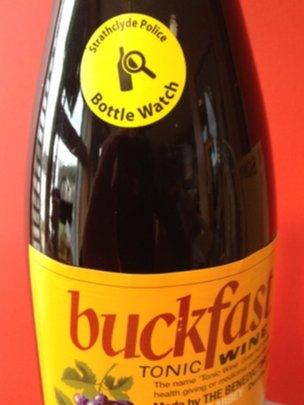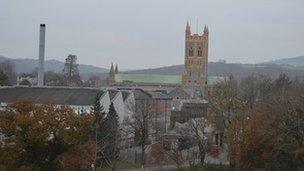Police Scotland apologise in Buckfast tonic wine case
- Published

Bottle marking allows police to trace bottles linked with crime back to the store where they were bought
Police Scotland have apologised to Buckfast's distributors for asking a shopkeeper to stop selling the product.
The force has also agreed not to include the tonic wine in any bottle-marking scheme unless it has "reasonable grounds" for doing so.
The undertakings were made by Assistant Chief Constable Wayne Mawson to settle a legal dispute with J Chandler and Co.
The distributor said it accepted what it regarded as a "very sincere" apology from the police.
Buckfast's lawyers took a case against what was Strathclyde Police to the Court of Session in February 2013.
They complained that officers had encouraged some retailers to attach police stickers to bottles of Buckfast and some other alcoholic drinks.
The system, known as bottle marking, allows the police to trace bottles associated with crime back to the store from which they were purchased.
J Chandler and Company argued that the anti-crime labels were being used illegally and in a way that discriminated against its brand.
They also claimed that one police officer had asked a shopkeeper in Ayrshire to withdraw Buckfast from sale.
Legal argument
After almost a year of legal argument, the two sides have settled the case without any judgment being made by the court.
Police Scotland, which took over Strathclyde's responsibilities in April 2013, has apologised to Buckfast for the actions of an individual officer who tried to stop a retailer from stocking the tonic wine.
It also apologised for any "distress or inconvenience" caused to the shopkeeper and promised not to target Buckfast in this way again.
In a written undertaking, Assistant Chief Constable Wayne Mawson said the police "will not request licensed retailers, situated anywhere in Scotland, to cease stocking for sale Buckfast Tonic Wine".
Buckfast's representative in Scotland, Jim Wilson, told the BBC: "We accept the apology and we believe it to be very sincere".
Bottle marking
Police Scotland has given a second undertaking not to include Buckfast in bottle-marking schemes without "reasonable grounds" for doing so.
It is not clear what difference that will make in practice.

The drink is produced on behalf of the Benedictine monks of Buckfast Abbey in Devon
A Police Scotland spokesperson said: "we can confirm there has been an amicable settlement between Police Scotland and the owners of Buckfast".
It is understood each side covered their own legal expenses and that no damages were paid.
Between 2010 and 2012, Strathclyde Police said Buckfast was mentioned in almost 6,500 crime reports.
J Chandler and Company has always said that it was not the drink but those who drink it irresponsibly that cause crime and anti-social behaviour.
Caffeine content
Earlier this week, 33-year-old Tracy Meikle from Glasgow was jailed for life for murdering 36-year-old Lorraine Foy while under the influence of Valium, Buckfast and cider.
Buckfast contains 15% alcohol by volume and the same amount of caffeine in each bottle as in eight cans of Coke.
The drink is produced on behalf of the Benedictine monks of Buckfast Abbey in Devon.
In December, Health Secretary Alex Neil called on the monks to "stop making it" or at least "stop selling it to young people".
The Abbot of Buckfast Abbey, David Charlesworth said at the time that he was upset at how the tonic wine was used by some people in Scotland.
"I don't want Buckfast Abbey to be associated with broken bottles and drunks", he said. "But is the product bad? No."
- Published25 December 2013
- Published25 December 2013
- Published22 February 2013